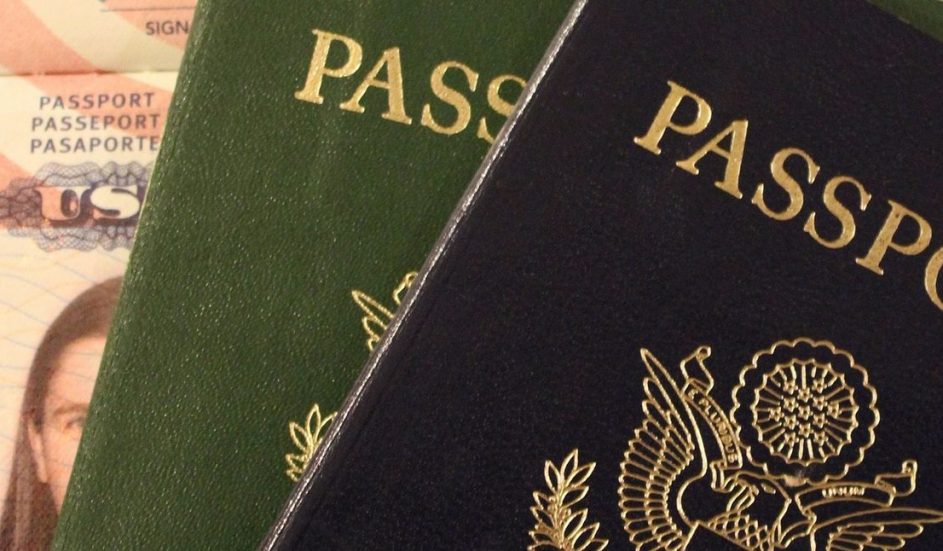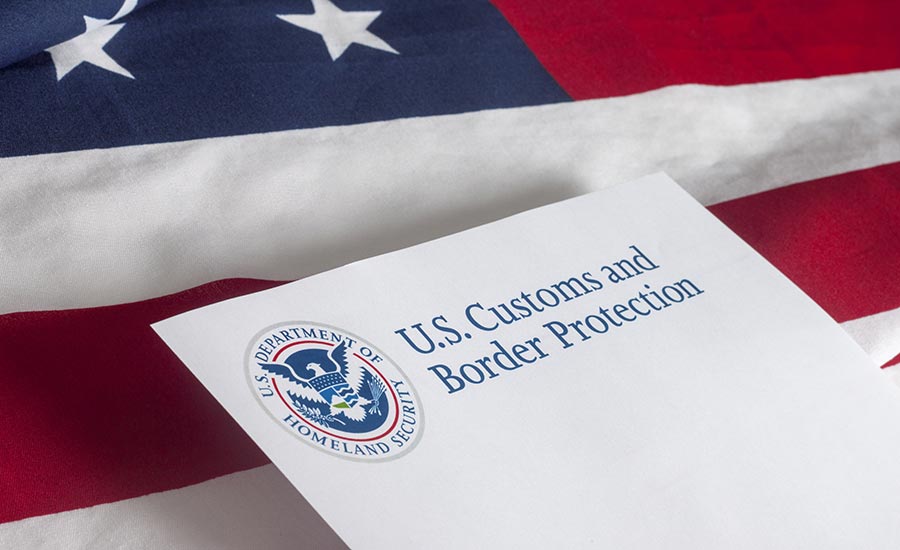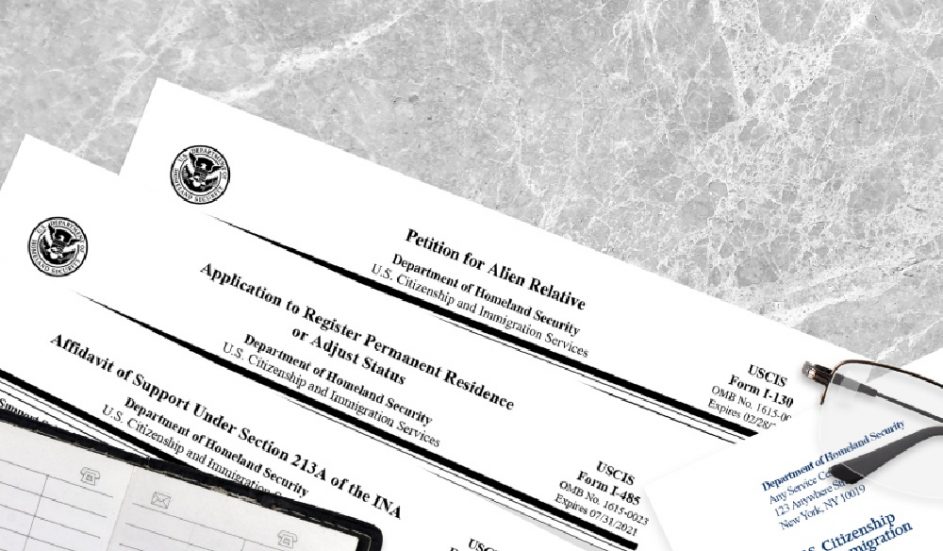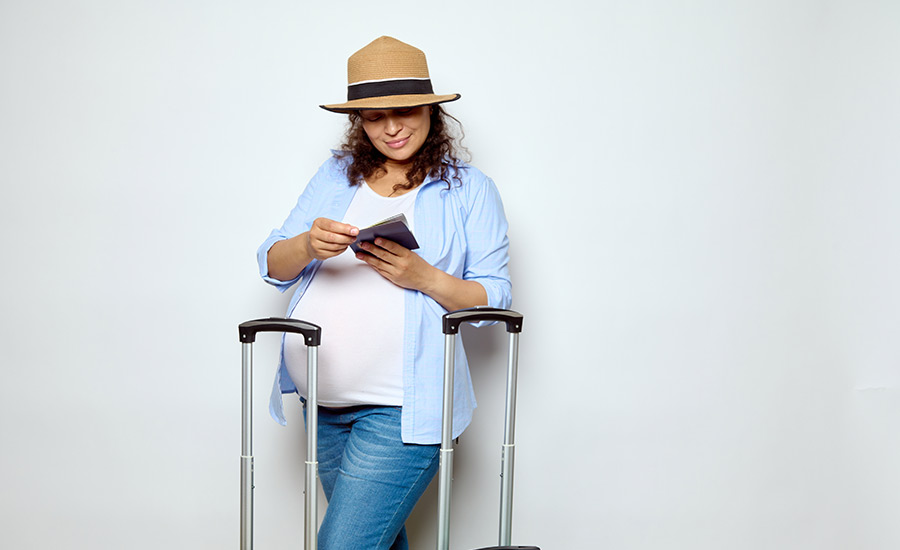

Giving Birth In The US On A Tourist Visa vs Birth Tourism: Key Takeaways
- Giving birth in the U.S. during a visit for family, tourism, or medical reasons differs from birth tourism, which involves traveling solely to obtain citizenship for the child through birth
- A child born in the U.S. automatically becomes a U.S. citizen, but this does not change the mother’s visa status
- Consular officers can deny a tourist visa to pregnant applicants if they suspect the primary purpose is birth tourism and not other legitimate reasons like medical care
- Pregnant applicants seeking medical treatment must prove they have a valid medical reason to travel, financial means, and the intent to return home after treatment
Each year, 33,000 babies are born in the U.S. as a result of birth tourism, on top of hundreds of thousands more born by women on temporary visas and illegal aliens.
Is giving birth in the U.S. while on a tourist visa always considered birth tourism? No, and we’re here to explain the difference.
In this article, we’ll break down:
- The difference between giving birth while visiting the United States and birth tourism
- The legal implications for both mother and child
- How U.S. immigration law treats each situation
- Recent policy changes affecting pregnant travelers
Giving Birth In The US On A Tourist Visa vs. Birth Tourism
Many people think that giving birth in the United States on a tourist visa is the same as birth tourism. However, there are several key differences between the two.
Giving Birth In The US On A Tourist Visa When Visiting For Other Valid Reasons
A pregnant woman may travel to the U.S. on a tourist visa for various reasons that are not necessarily related to childbirth. She may come to:
- Visit her family.
- For business or leisure.
- Seek medical treatment for conditions that cannot be treated in her home country.
If childbirth happens while you’re in the U.S. for valid reasons, it usually isn’t viewed as breaking immigration rules.
Birth Tourism Explained
Birth tourism, on the other hand, is the practice of traveling to another country, specifically to give birth in that country. Birth tourism often occurs on a temporary visa, such as a tourist visa.
Why are the United States an attractive place for birth tourism?
- Perceived stability: Accepted as a stable and prosperous country, the U.S. is an attractive place to give birth and raise a child.
- Citizenship benefits: Giving birth in the U.S. makes your child a U.S. citizen, which gives the child access to education, healthcare and potential career opportunities.
- Family reunification: Giving birth in the U.S. can be used as a pathway for the parents of a U.S. citizen to obtain legal immigration status in the U.S.
Some officials see birth tourism as a national security issue because:
- It can lead to the fraudulent acquirement of U.S. citizenship, bypassing the traditional immigration pathways and security screening procedures.
- It can strain healthcare and public services, impacting the well-being and security of citizens and legal residents.
As a result, birth tourism has provoked numerous discussions about tightening regulations to ensure that those who enter the U.S. come to the country for legitimate reasons and are not compromising national security.
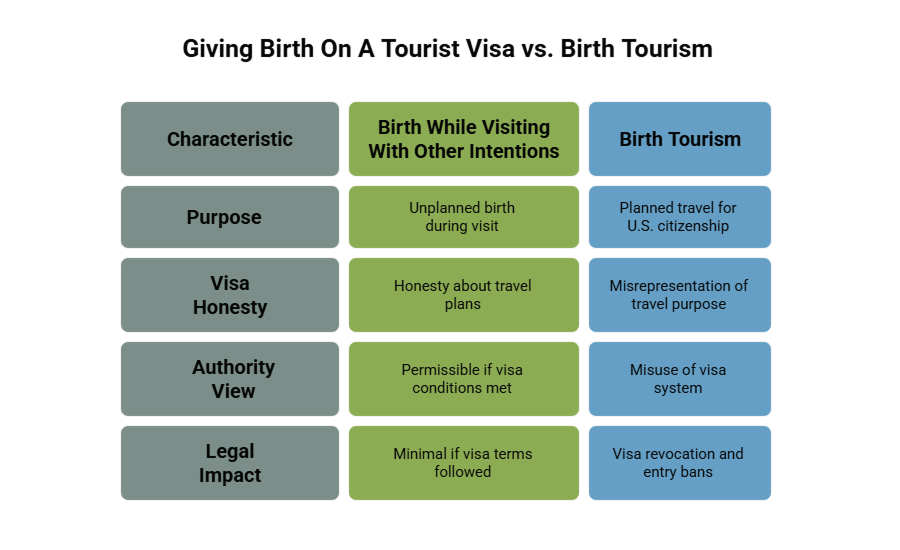
What Happens If You Give Birth In The US On A Tourist Visa?
Giving birth in the U.S. on a tourist visa has consequences for both the mother and child.
Legal Status Of A Child Born In The US
Under the 14th Amendment to the U.S. Constitution, any child born on U.S. soil automatically acquires U.S. citizenship, regardless of the parents’ nationality or visa status.
This principle is known as jus soli or birthright citizenship. It grants the child all rights and privileges of U.S. citizenship, including access to education, healthcare, and employment opportunities.
In addition to citizenship, being born in the U.S. allows your child to:
- Apply for a U.S. passport.
- Hold dual citizenship, depending on your home country’s laws.
Apart from benefits, however, U.S. citizenship also comes with certain obligations. If your child is born in the U.S. and therefore is a U.S. citizen, your child will typically:
- Have residency obligations, such as potential taxation on global income and the need to enter and exit the U.S. using a U.S. passport.
- Deal with immigration rules, even if they choose not to reside in the U.S.
Legal Implications For The Mother When Having A Baby On A Tourist Visa
Giving birth in the U.S. on a tourist visa does not automatically grant you the right to stay in the country based on the birth of your child.
Your visa status remains unchanged, and you will have to leave the U.S. before your visa expires.
If you do not leave the country after the expiration of your visa, this will be considered as overstaying a visa, which may result in:
- Future travel restrictions
- Challenges when applying for a visa for subsequent visits
- Deportation
In addition, if your primary purpose for entering the U.S. was to give birth and you did not truthfully represent your intentions to immigration officials, you:
- Can be charged with visa fraud due to willful misrepresentation of a material fact (that you were planning to have your baby in the U.S.
- Face visa denial for future visa applications, due to credibility concerns.
While giving birth in the U.S. does not directly grant you any type of immigration status, there may be pathways that can help you remain in the U.S. permanently.
These alternatives can include family-sponsored visas, employment-based visas, or other immigration categories. Talk to an experienced immigration attorney to understand your options.
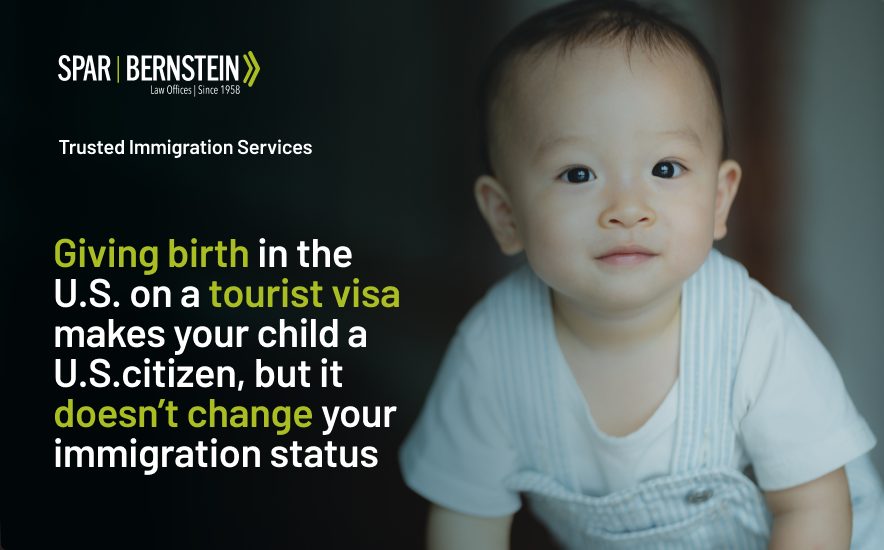
Recent Legal Developments Affecting Birthright Citizenship
In recent years, there have been significant legal changes concerning birthright citizenship in the United States.
In July, 2025, a federal judge in New Hampshire granted class-action status to a lawsuit aiming to protect babies who would lose birthright citizenship under the Trump administration.
The judge also temporarily blocked the President’s order restricting birthright citizenship nationwide for individuals who meet either of these conditions:
- Their mother was unlawfully present in the United States at the time of their birth, and their father was not a U.S. citizen or lawful permanent resident.
- Their mother was in the United States legally but only temporarily at the time of their birth, and their father was not a U.S. citizen or lawful permanent resident.
Rules For Giving Tourist Visas To Pregnant Women Traveling To The US
As per the U.S. government, traveling to the U.S. and giving birth with the intention to obtain U.S. citizenship for your child is not an acceptable reason for granting a B nonimmigrant visa.
Since January 2020, visa officers can turn down tourist visa applications if they believe the main goal is traveling solely for the purpose of obtaining U.S. citizenship for their child through birth.
However, the U.S. government recognized that foreign nationals may wish to travel to the U.S. for medical treatment while pregnant, which is different from birth tourism.
Applicants seeking medical treatment, including childbirth, must demonstrate:
- A legitimate medical reason to travel to the U.S. for medical treatment, such as a condition requiring specialized medical expertise, availability of advanced medical technology, chronic disease management, participation in a trial or experimental treatments that are not available in your country, or seeking second opinion
- A confirmation by a medical practitioner or facility stating that they agreed to provide treatment
- An estimated duration of stay in the U.S.
- A projected cost of treatment
- Proof that you can cover your medical treatment, transportation and living expenses, either on your own or with pre-arranged assistance from other parties
- Availability of funds to cover all associated costs such as financial statements
- Intent to return to their home country after treatment
The rule restricting tourist visas to pregnant women does not affect:
- F-1 academic visa applicants
- M-1 vocational student visa applicants
- H1-B work visa applicants
- Those seeking lawful permanent residence (Green Card) in the U.S.
If you are considering visiting the U.S. on a tourist visa, especially if you are pregnant, talk to legal experts to review the latest updates and get professional recommendations on next steps.
Need Legal Advice? Contact Spar & Bernstein
With a long-standing history and commitment to serving clients with care and compassion, our experienced team at The Law Offices of Spar & Bernstein provides a guiding hand in key areas of immigration, from nonimmigrant visas and marriage-based visas to family immigration and waivers.
Giving birth in the U.S. on a tourist visa can be extremely overwhelming. To help you in this life-changing situation, our knowledgeable and compassionate lawyers will:
- Take the time to understand your individual circumstances and explaining your rights,
- Provide insight into the implications of U.S. citizenship for your child.
- Explore various legal options for you and your child, such as addressing potential overstays, adjusting your visa category or seeking pathways for obtaining legal immigration status.
- Review your documentation to ensure accuracy and compliance with immigration regulations.
- Submit your application for extending your stay or changing your visa category, along with all necessary documents.
- Handle the communication with immigration officials on your behalf.
- Represent you and advocate on your behalf in case of visa denial, overstay issues or other problems.
- Provide peace of mind while you focus on caring for and bonding with your child.
With Spar & Bernstein, you can rest assured that you and your child are in good hands.
Giving Birth In The US On A Tourist Visa vs Birth Tourism: FAQs
Is it legal to give birth in the U.S. while on a tourist visa?
It’s legal to give birth while visiting the U.S. on a tourist visa as long as childbirth was not the main reason for your trip, and you were honest about your plans when entering the country.
What is birth tourism?
Birth tourism is when a woman travels to the U.S. specifically to give birth so that their child automatically becomes a U.S. citizen. If this intent is not disclosed to immigration officers, it may be considered visa fraud.
Will my baby be a U.S. citizen if born in the US?
Yes. Under the 14th Amendment, any child born in the U.S., regardless of the parents’ immigration status, is a U.S. citizen at birth.
Can I stay in the US after giving birth on a tourist visa?
No. Giving birth does not change your visa status and you must leave the U.S. before your visa expires. Talk to our knowledgeable and compassionate team at Spar & Bernstein about your legal options.



